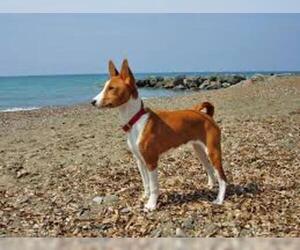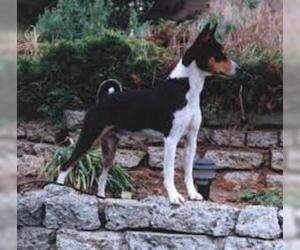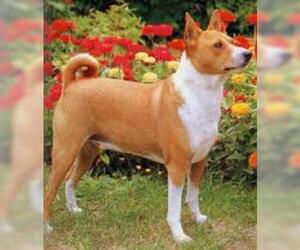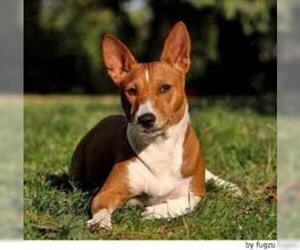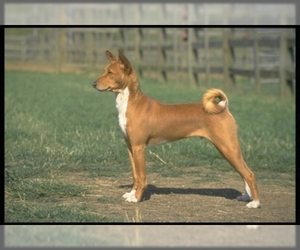
All about Basenji dog breed
A.K.A. :Congo Dog, African Barkless Dog, Zande Dog, Bush Dog, Ango Angari, "The Forest Dweller", "The Leaping Dog", Basset Hound, The Barkless Dog, Nyam Nyam Dog, Egyptian Sheep Dog, Khufu Dog, "King Tut's Dog", "The Pharaoh's Dog", "African Bush Hound", "African Forest Dog", "Congo Terrier", "Basenji Terrier", "Basenji Hound", "Central African Barkless Dog", "Equatorial Barkless Dog", "M'bwa m'kubwa", "Mbwa M'kubwa wa Kongo", "The Dog of the Pygmies", "The Dog of the Pharoahs"
Size
Grooming requirements
Exercise requirements
Good with other dogs
Watchdog ability
Energetic
Training requirements
Playful
Affectionate
Good with other pets
Good with children
Good with strangers
Winter
Summer
Healthiness
Protective
Life Span
| Pure Breeds | Member |
| Breeds A - Z | B |
| Breeds by Group | Hound Sighthound & Pariah |
| Breeds by Trait | Hypoallergenic Low Shedding |
| Overview: | The Basenji, often called the "barkless dog," is a fascinating breed originating from Central Africa, where it was historically used for hunting. Physically, they are medium-sized, graceful dogs with a distinctive short, fine coat that comes in various colors, often with white markings on the chest, feet, and tail tip. Their most recognizable features include a wrinkled forehead, alert pricked ears, and a tightly curled tail. Temperamentally, Basenjis are known for being intelligent, independent, and sometimes aloof, exhibiting a cat-like fastidiousness. They can be good companions for active families or individuals but require consistent training and socialization due to their high prey drive and independent nature. While generally suitable for apartment living if adequately exercised, their energy levels demand regular walks and mental stimulation. Health-wise, Basenjis are typically robust, but responsible breeders screen for conditions like Fanconi Syndrome and Progressive Retinal Atrophy. |
F.A.Q.
All You Need to Know About the Basenji Breed
The Basenji, often called the "barkless dog," originates from Central Africa and is a distinctive and intelligent hound. Known for their unique yodel-like sound, these medium-sized dogs are sleek, agile, and possess a curled tail and wrinkled forehead. Temperamentally, Basenjis are independent, curious, and can be quite affectionate with their families, though sometimes reserved with strangers. Their high energy levels require regular exercise; a secure yard and daily walks are essential, as their strong prey drive means they should always be leashed outside. Basenjis are relatively low-shedding and meticulously clean, making their grooming needs minimal. While adaptable to apartment living with sufficient activity, they thrive in homes that can provide mental stimulation to prevent boredom. Prospective owners should be aware of common health concerns like Fanconi syndrome and progressive retinal atrophy. They are generally good with older, respectful children but their strong will can make Basenji training a challenge for first-time dog owners, requiring patience and consistency.Basenji Weight: Average Size & Healthy Weight for Basenji
Adult Basenji typically weigh between 22-24 pounds. Males generally fall in the 23-24 pound range, while females are usually around 22-23 pounds. This narrow range indicates a healthy, athletic build characteristic of the breed.Curious about Basenji height? On average, a Basenji typically stands between 16 and 17 inches tall at the shoulder as a fully grown adult. This makes them a medium-sized breed, known for their elegant and compact build.
While the overall range is quite consistent, you might observe slight variations. Generally:- Males (dogs) tend to be on the slightly taller end, often reaching 16.5 to 17 inches.
- Females (bitches) are usually a bit smaller, commonly falling into the 16 to 16.5-inch range.
The Basenji breed is recognized by the AKC in several striking colors. The most common Basenji colors include Red & White, a classic deep red with white markings; Black & White, a glossy black with crisp white; and Brindle & White, featuring black stripes over a red or tan base with white. Less common but still officially recognized are Tri-color (Black, Red & White), which presents black with red/tan points and white; and Fawn & White, a range of tan shades from pale to deep with white. Some Basenjis may also be Cream & White or Sable & White, although these are less frequently seen.While not recognized by major kennel clubs like the AKC, some rare Basenji coat types and exotic Basenji variations can occur due to genetics, though these are not standard and may indicate mixed breeding or non-purebred lines. These can include shades like Blue & White, Chocolate & White, or even patterns like Merle. These exotic Basenji variations are highly unusual and typically not found in reputable purebred Basenji lines. When comparing Basenji colors for adoption or purchase, always refer to the AKC recognized Basenji colors for breed standard and health considerations, as non-standard colors can sometimes be linked to health issues or indicate a lack of purebred lineage. Pricing is generally not significantly affected by recognized colors, but puppies with rare Basenji coat types that are not breed standard may be offered at different prices.
The Basenji, often called the “barkless dog,” possesses a truly unique and engaging personality. Basenji personality is characterized by an intelligent, curious, and independent nature. They are generally friendly with their families, forming strong bonds and demonstrating a surprising amount of affection. However, their loyalty is typically reserved for their inner circle, and they can be quite reserved or aloof with strangers, taking time to warm up. While not overly sociable in the traditional sense of a "people-pleaser," Basenjis enjoy being part of family activities. They are known for their fastidious, cat-like grooming habits. Their temperament of Basenji with children can be good, especially if raised together and if the children understand how to interact respectfully with an independent dog. Close supervision is always recommended. Regarding other pets, Basenjis often do well with other dogs, particularly other Basenjis, but their strong prey drive means they may not be suitable for homes with small, non-canine pets like cats, rabbits, or birds unless introduced very carefully from a young age.Basenjis are moderately adaptable to apartment living provided they receive sufficient daily exercise and mental stimulation. They are not couch potatoes and require consistent training and opportunities to run and explore in a securely fenced area. Their independence can translate into a stubborn streak, making training a rewarding challenge that requires patience and positive reinforcement. They thrive on routine and consistency.
The Basenji temperament is quite unique. They are known for their independent and somewhat aloof nature, often described as cat-like. While generally reserved with strangers, a Basenji forms a deep and lasting bond with their family, displaying a quiet loyalty. They are not typically overly demonstrative but show affection in their own way.For sociability, Basenjis are not known for being overtly friendly with everyone they meet. They can be wary of new people and situations, preferring the company of their chosen humans. Early socialization is crucial to help them be more comfortable in varied environments.Regarding adaptability to apartment living, Basenjis can do well in apartments provided they receive adequate daily exercise and mental stimulation. They are relatively clean dogs and don't have a strong doggy odor. However, their high energy levels and need for secure containment are important considerations.When it comes to children, Basenjis can coexist peacefully, especially if raised with them. However, their independent spirit means they may not tolerate rough play and are often better suited to families with older, respectful children who understand how to interact with a more independent dog. Always supervise interactions between dogs and young children.With other pets, Basenjis can get along with other dogs, particularly if introduced properly and raised together. However, due to their strong prey drive, caution is advised around smaller, non-canine pets like cats, rabbits, or birds.Tendencies toward stubbornness or sensitivity are significant traits. Basenjis are highly intelligent but famously stubborn, making training a challenge for first-time dog owners. They respond best to positive reinforcement and consistent, patient methods. They can also be quite sensitive to harsh corrections or an unstable environment, preferring a calm and predictable routine. Owners should be prepared for their intelligent independence and use it to their advantage in training.In summary, the Basenji personality traits paint a picture of an intelligent, loyal, and independent companion dog behavior that thrives with a patient, experienced owner who appreciates their unique character.
Basenji Care: Your Guide to a Healthy, Happy CompanionUnderstanding Basenji care is crucial for this unique breed. While often perceived as low-maintenance, they have specific needs.Grooming Needs: Basenjis are known for being meticulously clean. Their short, fine coat requires minimal daily maintenance. A quick weekly brush removes loose hair and keeps their coat gleaming. They are naturally odorless and rarely require bathing, making them a low-energy dog breed to groom. Regular nail trims are essential to prevent discomfort.Exercise Limitations: Despite their sleek build, Basenjis are not high-stamina dogs for long, strenuous activities. Short, brisk walks and interactive playtime are usually sufficient. They thrive on mental stimulation and enjoy puzzle toys or training sessions. Avoid over-exercising in extreme temperatures.Dietary Considerations: A high-quality, balanced diet suitable for active, medium-sized breeds is recommended. Pay attention to portion control to prevent obesity, as Basenjis can gain weight easily. Consult your vet for specific dietary considerations tailored to your dog's age and activity level.Wrinkle and Ear Cleaning: Basenjis do not have the prominent wrinkles of some other breeds, but their facial folds and ears should be checked regularly. Clean their ears weekly with a vet-approved solution to prevent wax buildup and infections. Gently wipe any debris from their facial folds as needed.Climate Sensitivity: Basenjis are sensitive to cold due to their thin coats and lack of undercoat. In colder climates, they will need a coat or sweater for outdoor excursions. They are also prone to overheating in hot, humid weather, so ensure they have access to shade and fresh water during warmer months.Common Health Concerns & Prevention: To ensure a long, healthy life, understanding health tips for Basenji owners is vital. They are generally healthy but can be prone to certain issues. Regular vet check-ups are essential for early detection and prevention. Skin issues like allergies can occur; watch for excessive scratching or redness. Consistent dental care, including daily brushing, is crucial to prevent periodontal disease. Weight management through proper diet and exercise is paramount, as obesity can lead to numerous health problems. Genetic conditions like Fanconi Syndrome (kidney disease) and PRA (Progressive Retinal Atrophy) are also concerns, so responsible breeders will screen for these.
Basenji Activity Level: How Active Are Basenji?The Basenji has a moderate to high activity level, balancing short bursts of intense energy with long periods of rest. Despite their calm demeanor indoors, they are an intelligent and athletic breed with significant exercise needs.Typically, Basenjis require at least 30-60 minutes of vigorous exercise daily. This isn't just a leisurely stroll; they thrive on activities like running, brisk walks, and securely fenced-in playtime where they can sprint. Many enjoy activities such as lure coursing, agility, and hiking. Their independent nature and strong prey drive mean they should always be exercised on a leash or in a securely enclosed area to prevent them from chasing after interesting scents or small animals.Basenjis enjoy interactive playtime with their owners, especially games that involve chasing and exploring. They are curious and love to investigate their surroundings.It is important to note that Basenjis are not brachycephalic (short-nosed). This means they do not have the breathing limitations associated with brachycephalic breeds, and can tolerate exercise in a wider range of temperatures, though extreme heat should always be avoided for any dog.Due to their energy and need for mental stimulation, Basenjis are generally suitable for active families who can commit to meeting their daily exercise requirements. They are not ideal for low-energy households or those looking for a sedentary companion, as insufficient exercise can lead to boredom and destructive behaviors. While they enjoy their downtime, don't let their quiet nature fool you – a well-exercised Basenji is a happy and well-behaved Basenji.
Breed Breakdown: What Experts Say About the Basenji
I would rate the Basenji's "Size" trait a 3 out of 10.Basenjis are distinctly a small to medium-sized dog breed, leaning more towards the smaller end. They typically stand around 16-17 inches tall at the shoulder and weigh between 22-24 pounds. Their body structure is lean and athletic, not stocky or bulky. When compared to other companion dogs, they are significantly smaller than most retrievers, shepherds, or even many terrier breeds, and only slightly larger than true toy breeds like Chihuahuas or Yorkies. This compact size makes them exceptionally well-suited for apartment living, as they don't demand a vast amount of physical space indoors. Their moderate weight and manageable dimensions also make them an excellent choice for travel, fitting comfortably in car seats or airline carriers designed for smaller animals, and they are generally very easy to transport. Their lean build means they don't take up much room, making them ideal for households with space constraints where a larger dog would feel cramped.
I would rate the Basenji's "Grooming Requirements" at a 2.This breed is remarkably low-maintenance when it comes to grooming, placing it squarely at the "easy to care for" end of the spectrum compared to most other companion dogs. Their short, fine coat sheds minimally and doesn't tangle, requiring only occasional brushing (perhaps once a week) to remove loose hairs and maintain a healthy shine. Basenjis are known for their cat-like cleanliness, frequently self-grooming, which further reduces bathing needs to only when they are visibly dirty or smell. They generally don't have prominent skin folds that require special attention, and while ear cleaning and nail trimming are necessary, they are standard maintenance tasks for any dog and not particularly frequent or specialized for the Basenji. They are not particularly prone to skin issues or allergies that would necessitate extensive grooming.
I would rate the Basenji's "Exercise Requirements" at a 7 out of 10.While not a breed that needs to run for hours on end like some working dogs, Basenjis are far from couch potatoes. They possess a surprising amount of energy and stamina for their size, characteristic of a sighthound developed for hunting. Their daily activity recommendations lean towards structured routines, often benefiting from at least 45 minutes to an hour of vigorous exercise daily, which can be broken into multiple sessions. This might include brisk walks, jogging (on leash, as their prey drive is strong and they can be escape artists), and especially off-leash play in a securely fenced area where they can truly stretch their legs and sprint. They thrive on activities that engage both their physical body and their intelligent, somewhat mischievous minds. Basenjis are also known to excel in dog sports like lure coursing and agility, demonstrating their capacity for sustained movement and mental engagement. While they don't have the respiratory limitations of brachycephalic breeds, their lean, athletic build and independent nature mean they require consistent outlets for their energy to prevent boredom and destructive behaviors. Minimal activity would likely lead to a frustrated and potentially unruly Basenji, whereas a well-exercised Basenji is generally a calmer and more content companion.
I'd rate the Basenji's "Watchdog Ability" at a 4.While Basenjis are alert and certainly notice changes in their environment, their unique "barkless" nature significantly limits their effectiveness as a traditional watchdog. They will often react to unfamiliar sounds or people with their distinctive yodel, chortle, or growl, which can be an early warning sign for a keen owner. However, this vocalization is not typically as attention-grabbing or deterring as a sustained, loud bark from a breed truly designed for watch duties. Their territorial instincts exist, but they are generally more curious or aloof with strangers rather than aggressively protective. They are more likely to observe and potentially vocalize in their unique way than to actively challenge or intimidate an intruder. Therefore, while they might provide a meaningful *early awareness* for the owner due to their attentiveness, they are not a breed capable of providing a *deterrent* through their presence or vocalizations in the way a true watchdog would. They are much more of a passive companion in this regard, signaling changes rather than actively defending.
I would rate the Basenji's "Good with Other Dogs" trait as a 4 out of 10.While not inherently aggressive, Basenjis are often described as having a "cat-like" independence and can be selective about their canine companions. They typically possess a strong prey drive, which can lead to issues with smaller, high-energy dogs, and their aloof nature means they don't always gravitate towards playful interactions with unfamiliar dogs. While some Basenjis can coexist peacefully in multi-dog households, especially if raised with other dogs from a young age, they often prefer their own company or that of familiar, similarly quiet companions. They are generally not the type of dog to thrive in large, boisterous dog parks and can show dominance or impatience with overly boisterous or pushy canines. Careful, controlled introductions and consistent socialization are crucial for a Basenji to peacefully coexist with other dogs, and even then, they may never be "extremely sociable" in the way some other breeds are. They often require training to manage their independent streak and potential for selective tolerance rather than outright friendliness.
I would rate the Basenji's "Energetic" trait as an 8 out of 10.Basenjis are far from low-energy dogs; they are naturally very active and possess remarkable endurance for their size. They are renowned for their playful nature, often described as having a "cat-like" curiosity and agility. They have a significant need for physical stimulation, thriving on regular opportunities to run, explore, and engage in vigorous play. Their athleticism makes them well-suited for a variety of outdoor and athletic activities, including lure coursing, agility, and hiking. While they can be calm indoors once their exercise needs are met, they are definitely not a laid-back breed compared to most companion dogs.It's important to note that the Basenji is *not* a brachycephalic breed. They have a typical, well-proportioned muzzle, which means their anatomy does not negatively affect their stamina or exercise tolerance. In fact, their lean build and excellent respiratory function contribute to their high energy levels and ability to sustain prolonged physical activity.
I would rate the Basenji's "Training Requirements" at a 7.While intelligent, Basenjis are notoriously independent and possess a strong, almost cat-like stubborn streak. Their attention span can be fleeting, especially if they deem a task uninteresting, making it challenging to maintain their focus on repetitive drills. They are not naturally eager to please and will often weigh the benefit of obeying a command against their own desires in the moment. This means responsiveness to commands is often conditional and requires significant patience and consistency from the owner. Positive reinforcement is effective, but it needs to be highly motivating and creative to capture their interest. They are not a beginner-friendly breed and require an experienced handler who understands canine behavior, is consistent, and can implement structured routines with firm but fair boundaries. Expect training to be a continuous, ongoing process, not a one-time achievement.
I would rate the Basenji's "Playful" trait a 7 out of 10. While they are not the boisterous, endlessly fetch-driven dogs found in some retriever breeds, Basenjis are far from inactive or laid-back. They possess a natural spiritedness and a keen intelligence that fuels their play. They love games, especially those that involve chasing, stalking, and problem-solving, and will engage enthusiastically with toys that pique their interest, such as puzzle toys or squeaky objects. Their attention-seeking behavior often manifests as nudging, vocalizations (though not barking), or even playful nips to initiate interaction. They have bursts of zoomies and enjoy a good romp, but their play can also be more independent or focused on exploring their surroundings. Compared to some companion dogs, they are not as overtly "fun-loving" in the traditional, easy-to-entertain sense, as they require more mental stimulation and varied activities to keep their enthusiasm high.
I would rate the "Affectionate" trait of the Basenji at a 6.While Basenjis are undoubtedly loyal and form strong bonds with their families, they are not typically described as extremely loving and overtly people-oriented in the way some other companion breeds are. They do desire human companionship and will follow their family members around the house, often preferring to be in the same room. They are sensitive to their owner's emotions and will offer a quiet presence, but their expression of affection is often more subtle. Physical closeness like cuddling and lap-sitting is usually on their own terms; they enjoy warmth and comfort but aren't typically "velcro dogs" that constantly seek physical contact. They are more independent compared to many other companion dogs and can be quite self-possessed. They appreciate affection and are devoted to their "people," but they don't necessarily *thrive* on a constant barrage of overt affection in the way a golden retriever or a Cavalier King Charles Spaniel might. They value their space and can be quite cat-like in their demeanor, offering affection when they choose to, rather than constantly seeking it.
I would rate the Basenji's "Good with Other Pets" trait a 4 out of 10.While Basenjis can be good with other dogs, especially if raised together and properly socialized, their strong prey drive is a significant factor. This drive makes them naturally incompatible with smaller, non-canine pets like cats, rabbits, or birds, often viewing them as prey rather than companions. Coexistence with cats, in particular, requires immense supervision, extensive training, and often isn't truly peaceful, but rather a managed tolerance. Resource guarding can also be present, especially around food or favored toys, requiring management and training in multi-dog households. They are not naturally sociable with all other animals and require significant, ongoing training and supervision to coexist peacefully, particularly with different species. Even with other dogs, careful introductions and continued monitoring are essential, especially with dogs of the same sex or those with strong personalities. Their adaptability in a multi-pet household is heavily dependent on the type of pets and the owner's commitment to rigorous management and training.
The Basenji breed rates a 4 out of 10 for "Good with Children."While intelligent and playful with their chosen family, Basenjis are generally not naturally gentle or patient with children. Their independent and sometimes aloof temperament means they have a lower tolerance for the unpredictable noise, quick movements, and often clumsy handling that comes with children, especially younger ones. They are not known for their patience and can become easily overwhelmed or snappish if their boundaries are not respected. While they might tolerate older, more respectful children, their high energy can be overwhelming, and their lack of a strong desire to please means they don't always engage in gentle play. Training and constant supervision are absolutely crucial to ensure a harmonious environment, and even then, they may always prefer a quieter, more adult-centric household. They are not a breed that thrives on constant interaction or being treated like a toy, making them less suitable for families seeking an exceptionally child-friendly companion.
I would rate the Basenji's "Good with Strangers" trait as a 3.Basenjis are typically quite reserved and independent, especially with unfamiliar adults. They are not naturally outgoing or effusive, and tend to observe strangers with a discerning eye rather than immediately seeking interaction. While not inherently unfriendly, their default is often indifference or a polite distance. They are unlikely to bark excessively at strangers in a guarding capacity, as they generally aren't known for being guard dogs, but their "baroo" can be used to alert. Adaptability in guest-filled environments can vary; some Basenjis will tolerate guests quietly, while others might retreat or remain aloof. While early and consistent socialization can certainly help a Basenji be more comfortable and tolerant of strangers, it's generally to achieve a respectful acceptance rather than an enthusiastic welcome. They are unlikely to be the type of dog that joyfully greets every new person they meet.
The Basenji breed rates a 3 for "Winter" tolerance.Basenjis are extremely sensitive to cold due to their short, fine single coat, low body fat, and lean, athletic build. Their medium size offers little insulation, and while not brachycephalic, their lack of a dense undercoat or significant body fat makes them highly susceptible to hypothermia even in moderately cold temperatures. They are not built for cold-weather resilience and will shiver quickly.Compared to many other companion dogs, Basenjis absolutely require special care during winter months. They will need a warm, insulated dog coat or sweater for any outdoor activity, even for short potty breaks, once temperatures drop significantly. Extended outdoor play in cold climates is generally not safe for them, and they should be closely monitored for signs of discomfort or cold stress. Their indoor environment must also be kept comfortably warm, as they can chill even inside.
The Basenji breed's "Summer" tolerance rates a 6.5 on a scale from 1 to 10. While not brachycephalic, which is a significant advantage in heat regulation compared to breeds like Pugs or Bulldogs, Basenjis are still a short-coated breed with relatively low body fat, meaning they can feel the heat more intensely than long-coated, cold-weather breeds. They are not naturally equipped for sustained high temperatures. Their ability to regulate body temperature is average; they will pant to cool down like most dogs, but they don't have the "off switch" that some owners might expect. The risk of heatstroke is moderate; prolonged exposure to direct sun or strenuous exercise in hot, humid weather significantly increases this risk. Recommended outdoor activity levels in summer should be limited to early mornings or late evenings when temperatures are cooler, and always in shaded areas. Avoid peak midday heat for anything more than a quick potty break. They do not require the extreme climate control of a brachycephalic breed, but they certainly benefit from air conditioning or a cool, shaded environment indoors when temperatures climb. Compared to many other companion dogs, Basenjis require slightly more mindful care in summer months due to their energy levels, which can lead them to overexert themselves if not monitored, and their relatively thin coat which offers little insulation from the sun's rays. They don't have the built-in heat protection of a very thick double coat (which insulates against both cold and heat) nor the extreme sensitivity of a very short-nosed breed, placing them in a middle ground where vigilance and common sense are key.
I would rate the Basenji's "Healthiness" trait as a 7 out of 10.While generally considered a robust and healthy breed with a good life expectancy (around 13-14 years), they aren't without their specific genetic predispositions. They are not prone to the widespread joint issues or severe breathing difficulties seen in many other breeds. However, Basenjis do have a genetic susceptibility to Fanconi Syndrome, a kidney disorder that, if not managed early, can be fatal. Responsible breeding practices involving genetic testing have significantly reduced its prevalence, and early detection and treatment can lead to a good quality of life. Other concerns include certain eye conditions (like Progressive Retinal Atrophy and Coloboma) and occasional thyroid issues. They are generally considered lower maintenance in terms of their physical health compared to many purebreds that require extensive grooming or have inherent structural issues. However, the vigilance for Fanconi Syndrome means they aren't entirely "set it and forget it" in terms of health. Overall, with responsible breeding and preventive care, they are a healthy and resilient breed, but the presence of specific, potentially serious genetic conditions prevents a higher score.
I would rate the Basenji's "Protective" trait as a 3 out of 10.While Basenjis are incredibly alert and their keen senses make them excellent at noticing changes in their environment, their protective instincts are generally not aimed at defending their territory or owners in a confrontational way. They are notoriously independent and can be somewhat aloof, even with their families. They will definitely let you know if someone is at the door with a distinctive yodel or bark, making them decent watchdogs in the sense of alerting to an intruder. However, they lack the territorial aggression, size, or inherent drive to physically confront a threat, making them entirely unsuitable as a guard dog. Their reaction to strangers is more often a mix of curiosity and reserve, rather than immediate suspicion or aggression. They are very much a companion dog, offering loyalty in their unique, sometimes detached way, but not offering meaningful physical protection in a household setting.
I would rate the Basenji's "Life Span" trait a 7 out of 10.Basenjis are generally considered a long-lived breed compared to many other companion dogs. Their average life expectancy typically ranges from 12 to 14 years, with many individuals living beyond that. While they do have some genetic predispositions to health issues like Fanconi Syndrome (a kidney disorder) and certain eye conditions (e.g., Progressive Retinal Atrophy), responsible breeding practices and genetic testing have significantly reduced the prevalence of these issues. With proper care, including a balanced diet, regular exercise, and routine veterinary check-ups, Basenjis often enjoy healthy and extended lives. Their robust constitution and fewer widespread, debilitating health problems compared to some larger or more heavily bred dogs contribute to their above-average longevity.
Basenji Puppies for saleSee all puppies for sale
Basenji Dogs for adoptionSee all dogs for adoption
Basenji BreedersSee all breeders
Similar Dog Breeds for Basenji
Breed Mixes of Basenji
Quick Breed Selector 0 - not important, 1 - smallest, 10 - largest
Variants & Mistakes :Bazenji, Bansenji, Basengi, Basejni, Basenjii, Bassinji, Bassnaji, Bazengi, bsenji, bessenji, bagenji, basenj, basnj, baenji, basenju, basenjie, basnji, basenji dog, basenji-dog, baisenji, basenjey, basenjui, basenji's, basenjiis, basenji-like

